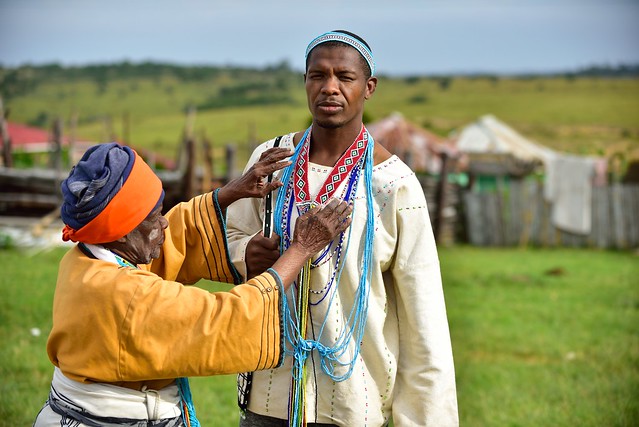Mental Health in South Africa: The Good News
 The South African Depression and Anxiety Group (SADAG) conducted a study that revealed the shocking state of mental health in the country. In fact, one-third of South Africans have a mental illness. However, 75 percent of them will not get any kind of help.
The South African Depression and Anxiety Group (SADAG) conducted a study that revealed the shocking state of mental health in the country. In fact, one-third of South Africans have a mental illness. However, 75 percent of them will not get any kind of help.
This is where SADAG comes in. SADAG is Africa’s largest mental health support and advocacy group. It is made up of experts who take calls from South Africans about their mental health questions and concerns. The group has a 16-line “counseling-and-referral” call center and work in “urban, peri-urban and the most rural communities across South Africa.”
SADAG is comprised of a network of over 200 mental health treatment facilities and support groups throughout the country. Its focus is on areas lacking widespread community health resources. The organization believes access to this type of treatment is fundamental to improving mental health in South Africa. Additionally, SADAG believes it can improve the overall quality of life while simultaneously influencing socio-economic issues in a positive way.
SADAG and Language
Since South Africa has 11 different official languages, SADAG offers workshops and training programs tailored to these languages for individual members. In fact, the programs also are tailored to corporate businesses, healers, doctors, care workers, correctional facilities, schools and churches.
Workshops and Campaigns
These workshops focus on how to openly and productively talk about illnesses such as depression, panic disorders, bipolar disorder, PTSD and suicide prevention. Furthermore, the workshop explores healthy ways to deal with stress in an attempt to reduce the stigma surrounding mental health.
SADAG is also working to disseminate mental health awareness beyond just those member organizations within the group. They have created media campaigns with a message of de-stigmatization of mental illness that runs on TV and radio. Additionally, the campaign runs via print and electronic press releases.
Finally, SADAG has been working especially hard with HIV and AIDS patients on coping skills to conquer depression and other mental illnesses that accompany a diagnosis. This is pivotal in the country where the leading cause of death is HIV/AIDS.
There are several other organizations located in the nine different provinces doing important work to improve mental health in South Africa.
- Care Haven Psychiatric Centre: This center provides residential accommodation and an arts and crafts area. The main purpose is to provide therapeutic care for those with mental illnesses who have been discharged from psychiatric hospitals, and who struggle to function independently in society.
- Port Elizabeth Mental Health: Located in Port Elizabeth, this organization provides social work intervention services, skills training and prevention towards better mental health. It also promotes neighborhood unities for children with disabilities who cannot access special daycare centers. Finally, the organization offers youth skills development centers.
- Bloemcare Psychiatric Hospital: This is a private psychiatric hospital in Bloemfontein in the Free State. It offers psychiatric programs and nursing care. Its programs help develop coping skills and group therapy environments to connect with others. Furthermore, the hospital has recreational facilities and dietitians to help promote the balance between physical and mental health.
- SA Federation for Mental Health: This is the largest mental health organization in South Africa located in Randburg, South Africa. They work to implement national awareness campaigns, empower mental health care users and organizations, advocate for human rights of mental health care users and conduct mental health research.
- Ekupholeni Mental Health and Trauma Centre: Located in Katlehong, South Africa, this center provides HIV/AIDS support and a bereavement program to counsel infected children, youth and adults.
- PsySSA: The Psychological Society of South Africa works to negotiate with the government and other legislative bodies to create programs that focus on mental health awareness development. Specifically, these programs focus on the unique circumstances of a post-Apartheid society.
- Durban & Coastal Mental Health Society: In addition to standard psychiatric care, this organization offers protective training workshops that promote self-worth, dignity and self-reliance for those with mental illnesses. The organization does this through job creation initiatives that encourage block making projects, gardening projects and supported employment.
- NICRO: This organization focuses on social crime prevention, juvenile justice and the reintegration of criminals into society during a tough transition.
- Mpumalanga Mental Health Society: Located in Secunda, South Africa, this organization advocates for the rights of the disabled, trains caregivers and provides social work services to those dealing with substance abuse.
- Careline Clinic: The goal of this clinic is to provide care while upholding human dignity. It provides psychotherapy and crisis resolution skills to encourage empathy for patients going through emotional trauma.
- MSF Rustenburg: This international NGO provides medical services and support, initiated by Doctors Without Borders. It focuses on providing support to domestic violence and sexual assault survivors. It is located in Rustenburg, South Africa.
- Bendiga House: Bendiga House is a facility helping those in recovery from trauma and those suffering from mental illness. It teaches independent living through lessons. For example, lessons are offered on budgeting, shopping and chores. It also provides group and music therapy, life skills training, exercise programs and supervised leisure and entertainment.
These great initiatives are tackling inter-sectional and systemic barriers that prevent adequate care for many marginalized communities. Overall, mental health in South Africa is improving via these organizations and initiatives.
– Meredith Breda
Photo: Flickr
